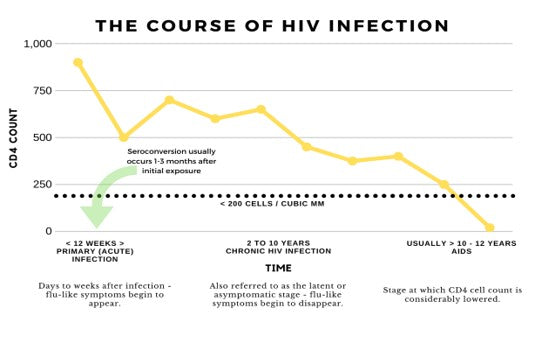How long does it take for HIV to infect the body?
What is HIV/AIDS?
HIV is the abbreviation for the Human Immunodeficiency Virus. HIV is a widespread virus that infects immune system cells and destroys them. See our blog post on ‘How does HIV affect the body?’ to find out more. Once the virus has destroyed too many immune system cells for the immune system to function properly, the virus is said to have progressed onto the AIDS stage of infection. AIDS stands for Acquired Immunodeficiency Syndrome. AIDS is a disease that has been prevalent for many decades and before treatment for HIV was available, persons who acquired HIV would usually die from AIDS in the end.
When is a person said to have AIDS?
A person is considered to have AIDS when the healthy white blood cell count falls below a certain range. At this point of HIV infection, the immune system is so badly damaged that a person cannot recover from the infection. Treatment methods can now prevent the extent of the progression and has significantly lowered the death rate of AIDS.
How long does it take for HIV to infect the body?
On average it takes 2 to 12 weeks after infection for the virus to take hold and for the body to start to mount its defence by developing antibodies. From the point of exposure, if any transmission took place, the person is said to have HIV. 72 hours after any possible exposure, a tablet can be taken that can prevent the onward transmission, if a person thinks they have recently been at risk, they can take the pill to prevent infection.
What happens during the stages of HIV infection?
Here are some of the differences between the initial stages of HIV and the end stage of HIV infection.
The first (early) stage:
Seroconversion (the time period during which a specific antibody develops and becomes detectable in the blood) usually occurs 1-3 months after infection, but symptoms can begin to appear days after initial exposure and is the period where the body starts to produce detectable levels of HIV antibodies. After seroconversion has occurred, HIV can be detected in blood tests for the antibody.
HIV can often be mistaken for the influenza virus, as the initial symptoms of HIV are similar to that of having a cold or flu. Symptoms include fever, hot and cold sweats, diarrhoea, headache, muscle pains and aches, sort throat, a rash most commonly found on the chest region, swollen lymph glands and mouth or genital ulcers.
The second stage:
The next stage of HIV infection is commonly referred to as the ‘chronic’ or latent’ stage of infection. HIV is asymptomatic which means that after a person has gone through the stages of seroconversion, their symptoms quickly disappear and unless a person knows that they have been at risk of contracting HIV; either by having a risky sex encounter/mishaps occurring during sex i.e. a condom breaking or coming off during sex or via drug use often sharing needles between users, people usually assume that they have not been exposed to anything and assume they are fine. And although 4 in 5 people get symptoms, 1 in 5 do not.
This graph shows the course of HIV infection without treatment:

The last stage:
Acquired immunodeficiency syndrome is the final stage of HIV infection. This is the stage at which the CD4 cell count falls below 200 cells per cubic millimetre of blood, as shown in the graph above. A healthy CD4 cell count is between 500 and 1500. With thanks to modern science and treatment, the life expectancy of someone living with HIV has greatly improved. Without the intervention of treatment, a person who has been living with HIV for many years will have a considerably lower viral count, consequently greatly compromising their immune system.
What could attack a person’s immune system if they have AIDS?
Increased risk of Kaposi sarcoma (a cancer of the blood vessel linings) is a possible occurrence and has the potential to cause death in very serious cases. This type of cancer is very rare globally but is common amongst people living with HIV. Symptoms include red/purple lesions on the skin and mouth and can lead to problems in the lungs and other internal organs.
What affects the progression of HIV?
The progression of HIV highly depends on how quickly a person is diagnosed. HIV diagnosis is difficult to determine as the virus is asymptomatic, but modern testing has provided extensive aid in many countries globally and continues to help end the epidemic.
About The Author

Becky Smith
Becky is a post graduate from Bournemouth University with a background in chemistry, biology and epidemiology. She works with the BioSure team as a Quality Manager.


